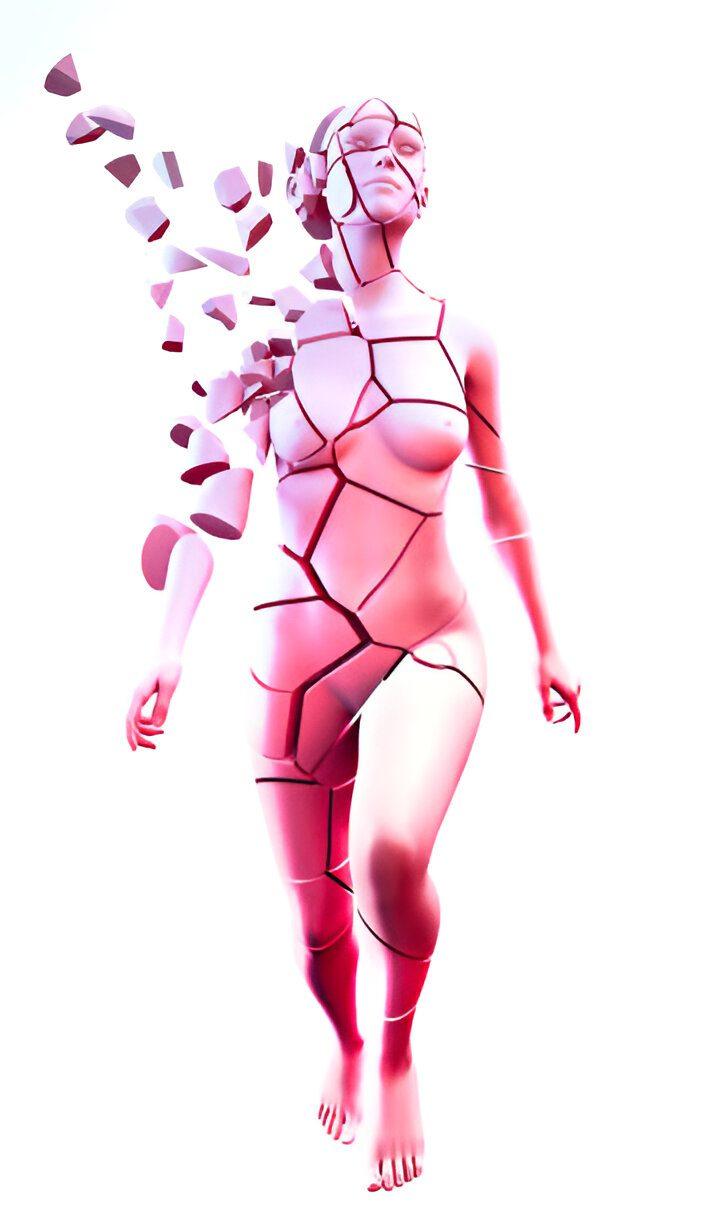The Emotional Toll of Chronic Illness
A chronic illness diagnosis is more than a medical event—it’s a profound shift in daily life that tests one’s emotions and sense of self. Conditions like Lupus, MS, Fibromyalgia, or Chronic Fatigue Syndrome reach beyond their physical symptoms, compelling those diagnosed to grieve the loss of who they once were. Unlike acute illnesses that may resolve, these persistent conditions demand continual adjustments and mournful acceptance, creating a long, nuanced journey of healing and hope.
When the Old Life Fades: Grieving a Chronic Illness

The Grief of Losing Your Old Life
Chronic illness can trigger a unique form of grief, one that isn’t a single event but an extended, evolving process as conditions fluctuate and time passes.
The Shock of Diagnosis
Denial or disbelief often comes first, providing a temporary buffer against the stark reality.
Analogy: Like planning a long trip, only to realize your map is suddenly obsolete—you must navigate unknown territory.
Anger and Frustration
Simple activities become exhausting, and beloved hobbies may be out of reach.
Analogy: A dancer who can’t move freely anymore, forced to watch instead of join.
Bargaining: Searching for a Way Out
Clinging to strict diets, new treatments, or lifestyle shifts in hopes of regaining lost health.
While self-care is crucial, certain aspects of chronic illness remain beyond personal control.
Depression and Isolation
Grief for lost abilities, normalcy, and independence can deepen into persistent sadness.
Analogy: The world moves on at normal speed, while you’re stuck in slow motion, struggling to keep pace.
Acceptance and Adjusting to a New Normal
Acceptance is about carving fresh paths within new limitations, redefining purpose rather than surrendering hope.
Analogy: A river meeting an obstacle doesn’t stop; it charts a different course.
Navigating Emotional and Psychological Challenges
Strategies for Coping and Healing
1. Acknowledge and Process the Grief
- Therapy, journaling, and support groups can offer outlets to explore your feelings freely.
- Mourning your old life is healthy—allow yourself to feel sadness and loss without guilt.
2. Redefine Goals and Purpose
- Adjust expectations, aiming for achievements that honor your new reality.
- Even small victories (like preparing a meal on a difficult day) can restore a sense of self-worth.
3. Build a Support System
- Chronic Illness Communities: Online or in-person groups where shared experiences validate your emotions.
- Educate Loved Ones: Explain symptoms, limitations, and emotional needs to foster understanding.
4. Prioritize Mental and Physical Well-Being
- Mindfulness & Meditation: Calm anxiety and cultivate acceptance.
- Adaptive Physical Activities: Gentle walks, chair yoga, swimming—nurture your body within safe limits.
- Rest & Pacing: Listen to your body’s cues to avoid burnout or exacerbations.
5. Let Go of Societal Expectations
- Society often prizes constant productivity, but chronic illness demands self-care and boundary-setting.
- Saying “no” protects your energy and preserves your well-being.
1. The Emotional Weight of an Unseen Illness
- Invisible symptoms—pain, fatigue, brain fog—can cause others to misunderstand or minimize the struggle.
- This misunderstanding often leads to frustration and loneliness.
2. Loss of Independence and Identity
- Careers might shift or end, relationships may be tested, and personal interests put on hold.
- The person you were before illness isn’t the same person living with ongoing symptoms.
3. Dealing with Unpredictability
- Symptoms vary day-to-day, making it hard to plan or maintain routines.
- Frequent cancelations, strained relationships, and emotional highs and lows contribute to mental exhaustion.
Finding Hope and Acceptance
Though chronic illness presents real losses, it can also lead to unexpected personal insights:
- Discovering New Passions: In adjusting to physical limitations, some find creative outlets they previously overlooked.
- Strengthening Relationships: Honest communication about needs can deepen bonds with loved ones who genuinely care.
- Celebrating Small Joys: A decent day free of severe symptoms, a short walk in the sunshine—each success can become a source of gratitude and motivation.
“Your diagnosis may change your path, but it can’t define your spirit. In the quiet moments of rest and reflection, you’ll find the resilience that still shines.” — Tessa M.
Things To Try This Week
Small Journaling Habit:
- Write three short sentences about how you feel today—physically, emotionally, and mentally. Embrace each truth without self-judgment.
Reach Out to a Support Group:
- Whether online or local, share a bit of your story or read others’ experiences. Feeling less alone can lighten the emotional load.
Celebrate One Small Triumph:
- Did you manage a quick household task or a moment of creativity? Acknowledge it. Let that sense of accomplishment fuel hope for tomorrow.
Conclusion
Grieving the life once known while adapting to chronic illness is a deeply personal journey, demanding patience, vulnerability, and courage. While some days may feel overshadowed by pain or fatigue, hope remains in each choice to care for yourself, seek support, and embrace simple joys in this new reality.
Chronic illness alters how you live, but it doesn’t erase your worth, your passions, or your capacity to find meaning. Through time, community, and self-compassion, you can learn to coexist with your diagnosis—an ever-present reminder of strength and resilience, despite the challenges. 💙
Living with a chronic illness is as much an emotional journey as a physical one. Each step you take toward adaptation, self-care, and gentle acceptance can bring comfort and newfound purpose.
Explore our cherish collections below for reflections, uplifting reminders, and supportive resources—helping you discover resilience, one mindful moment at a time.
More Reflections, More Growth
Loss is complex, and the road to healing is different for everyone. These reflections offer insight, support, and guidance as you navigate this journey.
When Grief Weighs on Mind, Body, and Spirit: Understanding the Silent Toll of Loss
Grief touches every part of us—the mind, body, and spirit. From cognitive fog to broken heart syndrome, this guide explores the full spectrum of grief’s effects and offers insights into how we can heal and carry the weight of our loss.
Debunking the “Time Heals All Wounds” Myth: Transforming Grief Through Active Healing
Grief doesn’t fade with time—it requires active participation and healing. Learn why “time heals all wounds” is a myth and how engaging in grief through expression, ritual, and support can lead to true emotional recovery.
The Link Between Grief and Heart Problems: Why Loss Can Literally Break Your Heart
Grief doesn’t just affect the heart emotionally—it has real physical consequences on cardiovascular health. Learn about the link between grief and heart problems, including Broken Heart Syndrome, and discover how to protect your heart during mourning.
Grief and Weight Changes: Why You Might Lose or Gain Weight After a Loss
Grief can lead to significant weight changes, whether through appetite loss or emotional eating. This page explains the science behind grief-related weight fluctuations and offers guidance on how to manage these changes during the healing process.
When Grief and Insomnia Collide: Why You Can’t Sleep After a Loss (And How to Fix It)
Grief affects more than just the heart—it has profound physical effects. This page explores how grief impacts the body, from stress responses to immune system suppression, and offers tips on how to care for your body while grieving.
Why Does Grief Make You Feel Sick? The Science Behind Grief’s Impact on Your Body
Grief isn’t just emotional—it’s physical. While many expect to feel sadness or mental fatigue after losing someone significant, fewer anticipate the profound bodily aches, exhaustion, and even flu-like symptoms that grief can trigger. By disrupting...
Healing After Heartbreak: Understanding the Link Between Grief and Heart Disease
Grief can have a significant impact on your heart health, leading to conditions like Broken Heart Syndrome. This article explains the link between emotional distress and heart disease and offers tips for protecting your heart while navigating the difficult journey of grief.
When the Mind Mourns: Navigating Grief After an Alzheimer’s Diagnosis
A diagnosis of Alzheimer’s triggers anticipatory grief and emotional loss. This article offers guidance for coping with the sorrow of seeing a loved one’s personality fade and maintaining meaningful connections through Alzheimer’s care.
Holding Onto Hope: Coping with the Emotional Toll of a Cancer Diagnosis
A cancer diagnosis brings overwhelming emotions—fear, sadness, and anger. Learn how to cope with the emotional toll of cancer, find resilience, and hold onto hope during this challenging journey.
Explore Journeys of Healing and Solace:
Discover dedicated spaces that offer understanding, guidance, and connection through grief. From the loss of loved ones to life’s challenging transitions, each category provides a pathway to reflect, connect, and find peace in shared experiences.


























